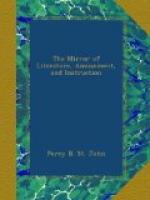This mournful event, combined with discouraging prospects of a mercantile nature, induced our author to retire from commercial pursuits on his own behalf; and in 1810 he obtained a situation as a clerk in the Woodbridge bank, which he still holds.
Soon after Mr. Barton had entered upon his present situation, he began “to commit the sin of rhyme,” and a new provincial paper being established about this time, it became the vehicle of his effusions: by degrees our young poet became bold enough to send a short piece now and then to a London paper, and at last, in 1812, ventured on an anonymous volume, entitled Metrical Effusions, 250 copies of which were printed by a bookseller of Woodbridge, and sold within the immediate circle of our author’s acquaintance. In 1818, Mr. Barton printed, by subscription, an elegant volume, in elephant octavo, of Poems by an Amateur, of which 150 only were struck off, and none ever sold at the shops. Encouraged by the very flattering manner in which these impressions of his poems were received by his friends, our author at last ventured to publish, in a small volume, Poems, by Bernard Barton, which was very favourably noticed by the literary journals, and, being afterwards made still more known by an article in the Edinburgh Review, has now reached a third edition. He afterwards published, in a handsome octavo volume, his Napoleon and other Poems; and subsequently a volume of poems, entitled A Widow’s Tale, which appeared in an early month of the present year.
Such has been the literary career of Bernard Barton. If it have not left behind it the brilliant track of other poetical comets, it has been less erratic in its course; and if it have not been irradiated by the full blaze of a noonday sun, it has nevertheless been illumined by the silver lustre of the queen of night; and his Parnassian vespers may be said to possess all the mild and soothing beauties of the evening star. If his muse have not always reached the sunward path of the soaring eagle, it is no extravagant praise to say, that she has often emulated the sublimity of his aerial flight. But the great charm thrown around the effusions of the Suffolk bard is that “lucid veil” of morality and religion which “covers but not conceals”—that “silver net-work,” through which his poetic “apples of gold” shine with an adventitious beauty, which even the gorgeous ornaments so profusely lavished by a Byron or a Moore would fail to invest them.
There is a fame which owes its spell
To popular applause alone;
Which seems on lip and tongue to dwell,
And finds—in others’
breath—its own;
For such the eager worldling sighs,
And this the fickle world supplies.
There is a nobler fame—which
draws
Its purer essence from the
heart;
Which only seeks that calm applause
The virtuous and the wise
impart:
Such fame beyond the grave shall live:
But this the world can never give.




